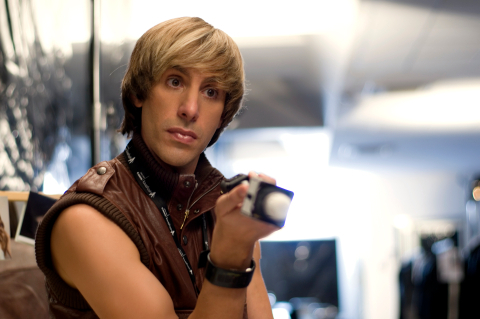Brüno is a welcome satirical counterblast to the shallow celebrity culture currently engulfing the western world but also another triumph for Sacha Baron Cohen and director Larry Charles.
The first and most important thing about the latest film featuring a character from Da Ali G Show is that it is really funny.
Much of it contains sequences that are not only hilarious but also peppered with an anarchic intelligence that will prompt many to think ‘am I really watching this?’ whilst they laugh out loud.
Forget the shallow hipsters who complained with the mantra that ‘yeah, Borat was OK, but it wasn’t the funniest film ever‘ (which it wasn’t despite being a groundbreaking studio comedy) because Bruno takes the Borat baton and runs further and faster.
If you are unfamiliar with the central character (played by Sacha Baron Cohen), he is a flamboyant gay Austrian fashion journalist, who first appeared in segments on Da Ali G Show.
He often interviews unsuspecting guests about fashion, entertainment, celebrities often making them uncomfortable with his oblivious references to gay sex or the Holocaust.
The arc of this film sees Bruno blacklisted from his usual haunts after causing a major scene at Milan fashion week and then following him as he tries to make it big in the US.
With the help of his sidekick Lutz (Gustaf Hammarsten) he tries to get a pilot together with the help of an agent and interviews all manner of people including Paula Abdul, Harrison Ford and Ron Paul.
There are also some stand out sequences involving Bruno going to the Middle East where he upsets orthodox Jews and Palestinian terrorists; an uncomfortable appearance on a TV chat show where he unveils an adopted African child; an extended attempt to ‘become straight’ with the help of religion, martial arts and the US military and a truly riotous climax involving a cage wrestling match in Arkansas.
It utilizes the techniques used in Borat and Religulous in which various people were contacted and slyly duped into signing release forms before being interviewed.
I suspect that some will think that a lot of the scenes were faked or setup given their outrageous and uncomfortable nature.
Although I wouldn’t doubt that some clever editing has been employed I actually suspect much of it actually happened.
When I spoke with Larry Charles last October he told me how on Borat and Religulous he learned that the irony is that people are dying to speak on camera if you give them a vague outline of what the film is about.
He also stressed the key in a lot of scenes was to keep the cameras running until they were literally shut down.
Bruno seems like the most extreme example yet of this kind of comedy guerrilla film making and there were long stretches where I was in awe of Baron Cohen’s ability to keep his character going in the craziest of situations, where arrest or physical harm seemed likely.
It is the underlying and often uncomfortable sense of comic dread
in the various situations that gives the film its raw power and ability to surprise even if it bears many structural and stylistic similarities to Borat.
What makes it a sharper and more audacious film than its predecessor though is its ability to scratch a little deeper.
It gleefully exposes the prejudices of various cultures towards homosexuality but also manages to turn the tables on the vapid cultures of modern-day celebrity and the fashion world.
Previous satires such as Pret-a-Porter (1994) never worked because – aside from being poorly made – the fashion world is arguably beyond parody anyway.
But somehow Charles, Baron Cohen and his team of writers have managed to have their cake and eat it – Bruno is a repellent narcissist who actually mirrors and lampoons the inanities of fashionistas and the wider celebrity culture.
One sequence in which he asks for help in finding which charity is ‘hot’ at the moment seems like a throwaway scene but is more pointed than it may seem on first viewing.
Somehow the character of Bruno feels like the perfect double agent in the age of Paris Hilton, reality TV and celebrity magazines which take themselves more seriously than even they know.
This has been one of the features of an extraordinary marketing campaign which has seen Baron Cohen promote the film in character (a clever move repeated from Borat).
So far it has seen him get a load of publicity by staging a stunt with Eminem at the MTV awards, dress up at various premieres around the globe and engage with fans via some clever social media marketing (including specially branded pages on MeinSpace, Tvitter and Facebuch).
The irony of all this is that the film is likely to be a big mainstream hit, perhaps proof that Bruno is the ultimate comedic double agent: a fake celebrity highlighting the very fakeness of celebrity itself.
> Official site
> Bruno at the IMDb
> Read other reviews of the film at Metacritic
